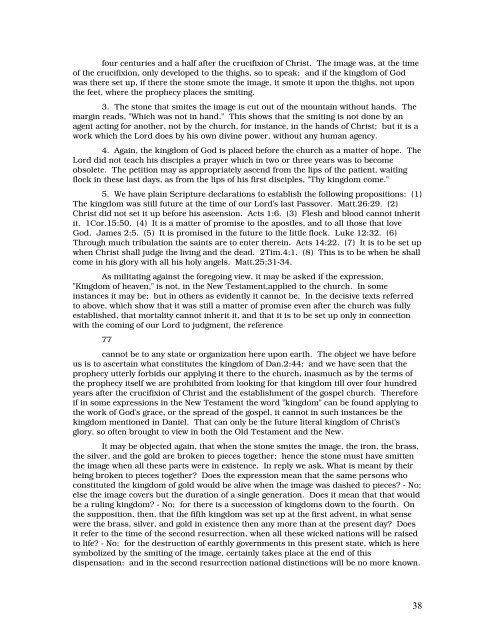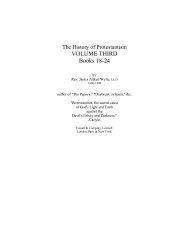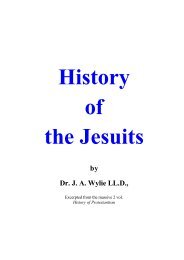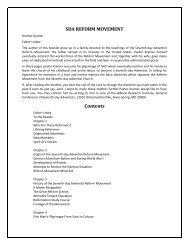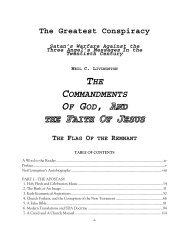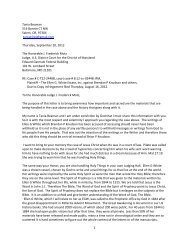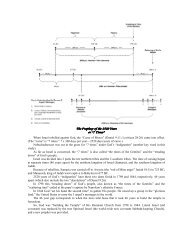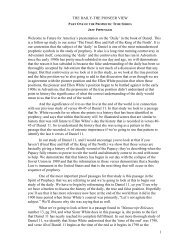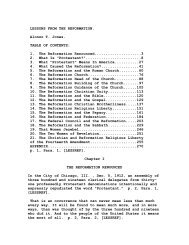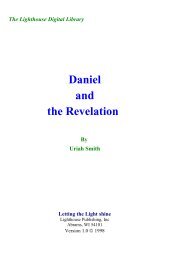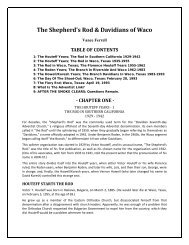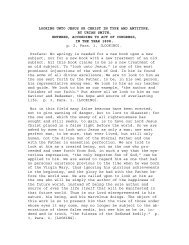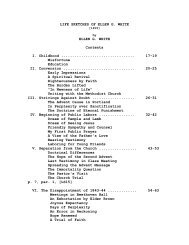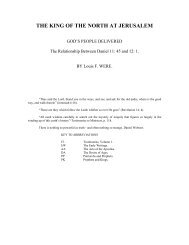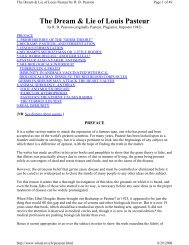Daniel and the Revelation. Uriah Smith
Daniel and the Revelation. Uriah Smith
Daniel and the Revelation. Uriah Smith
Create successful ePaper yourself
Turn your PDF publications into a flip-book with our unique Google optimized e-Paper software.
four centuries <strong>and</strong> a half after <strong>the</strong> crucifixion of Christ. The image was, at <strong>the</strong> time<br />
of <strong>the</strong> crucifixion, only developed to <strong>the</strong> thighs, so to speak; <strong>and</strong> if <strong>the</strong> kingdom of God<br />
was <strong>the</strong>re set up, if <strong>the</strong>re <strong>the</strong> stone smote <strong>the</strong> image, it smote it upon <strong>the</strong> thighs, not upon<br />
<strong>the</strong> feet, where <strong>the</strong> prophecy places <strong>the</strong> smiting.<br />
3. The stone that smites <strong>the</strong> image is cut out of <strong>the</strong> mountain without h<strong>and</strong>s. The<br />
margin reads, "Which was not in h<strong>and</strong>." This shows that <strong>the</strong> smiting is not done by an<br />
agent acting for ano<strong>the</strong>r, not by <strong>the</strong> church, for instance, in <strong>the</strong> h<strong>and</strong>s of Christ; but it is a<br />
work which <strong>the</strong> Lord does by his own divine power, without any human agency.<br />
4. Again, <strong>the</strong> kingdom of God is placed before <strong>the</strong> church as a matter of hope. The<br />
Lord did not teach his disciples a prayer which in two or three years was to become<br />
obsolete. The petition may as appropriately ascend from <strong>the</strong> lips of <strong>the</strong> patient, waiting<br />
flock in <strong>the</strong>se last days, as from <strong>the</strong> lips of his first disciples, "Thy kingdom come."<br />
5. We have plain Scripture declarations to establish <strong>the</strong> following propositions: (1)<br />
The kingdom was still future at <strong>the</strong> time of our Lord's last Passover. Matt.26:29. (2)<br />
Christ did not set it up before his ascension. Acts 1:6. (3) Flesh <strong>and</strong> blood cannot inherit<br />
it. 1Cor.15:50. (4) It is a matter of promise to <strong>the</strong> apostles, <strong>and</strong> to all those that love<br />
God. James 2:5. (5) It is promised in <strong>the</strong> future to <strong>the</strong> little flock. Luke 12:32. (6)<br />
Through much tribulation <strong>the</strong> saints are to enter <strong>the</strong>rein. Acts 14:22. (7) It is to be set up<br />
when Christ shall judge <strong>the</strong> living <strong>and</strong> <strong>the</strong> dead. 2Tim.4:1. (8) This is to be when he shall<br />
come in his glory with all his holy angels. Matt.25:31-34.<br />
As militating against <strong>the</strong> foregoing view, it may be asked if <strong>the</strong> expression,<br />
"Kingdom of heaven," is not, in <strong>the</strong> New Testament,applied to <strong>the</strong> church. In some<br />
instances it may be; but in o<strong>the</strong>rs as evidently it cannot be. In <strong>the</strong> decisive texts referred<br />
to above, which show that it was still a matter of promise even after <strong>the</strong> church was fully<br />
established, that mortality cannot inherit it, <strong>and</strong> that it is to be set up only in connection<br />
with <strong>the</strong> coming of our Lord to judgment, <strong>the</strong> reference<br />
77<br />
cannot be to any state or organization here upon earth. The object we have before<br />
us is to ascertain what constitutes <strong>the</strong> kingdom of Dan.2:44; <strong>and</strong> we have seen that <strong>the</strong><br />
prophecy utterly forbids our applying it <strong>the</strong>re to <strong>the</strong> church, inasmuch as by <strong>the</strong> terms of<br />
<strong>the</strong> prophecy itself we are prohibited from looking for that kingdom till over four hundred<br />
years after <strong>the</strong> crucifixion of Christ <strong>and</strong> <strong>the</strong> establishment of <strong>the</strong> gospel church. Therefore<br />
if in some expressions in <strong>the</strong> New Testament <strong>the</strong> word "kingdom" can be found applying to<br />
<strong>the</strong> work of God's grace, or <strong>the</strong> spread of <strong>the</strong> gospel, it cannot in such instances be <strong>the</strong><br />
kingdom mentioned in <strong>Daniel</strong>. That can only be <strong>the</strong> future literal kingdom of Christ's<br />
glory, so often brought to view in both <strong>the</strong> Old Testament <strong>and</strong> <strong>the</strong> New.<br />
It may be objected again, that when <strong>the</strong> stone smites <strong>the</strong> image, <strong>the</strong> iron, <strong>the</strong> brass,<br />
<strong>the</strong> silver, <strong>and</strong> <strong>the</strong> gold are broken to pieces toge<strong>the</strong>r; hence <strong>the</strong> stone must have smitten<br />
<strong>the</strong> image when all <strong>the</strong>se parts were in existence. In reply we ask, What is meant by <strong>the</strong>ir<br />
being broken to pieces toge<strong>the</strong>r? Does <strong>the</strong> expression mean that <strong>the</strong> same persons who<br />
constituted <strong>the</strong> kingdom of gold would be alive when <strong>the</strong> image was dashed to pieces? - No;<br />
else <strong>the</strong> image covers but <strong>the</strong> duration of a single generation. Does it mean that that would<br />
be a ruling kingdom? - No; for <strong>the</strong>re is a succession of kingdoms down to <strong>the</strong> fourth. On<br />
<strong>the</strong> supposition, <strong>the</strong>n, that <strong>the</strong> fifth kingdom was set up at <strong>the</strong> first advent, in what sense<br />
were <strong>the</strong> brass, silver, <strong>and</strong> gold in existence <strong>the</strong>n any more than at <strong>the</strong> present day? Does<br />
it refer to <strong>the</strong> time of <strong>the</strong> second resurrection, when all <strong>the</strong>se wicked nations will be raised<br />
to life? - No; for <strong>the</strong> destruction of earthly governments in this present state, which is here<br />
symbolized by <strong>the</strong> smiting of <strong>the</strong> image, certainly takes place at <strong>the</strong> end of this<br />
dispensation; <strong>and</strong> in <strong>the</strong> second resurrection national distinctions will be no more known.<br />
38


